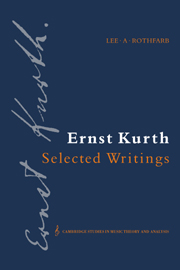Book contents
- Frontmatter
- Contents
- Foreword by Ian Bent
- Preface
- Notes on the translation
- Introduction
- Part I Grundlagen des linearen Kontrapunkts (Foundations of linear counterpoint)
- Part II Romantische Harmonik und ihre Krise in Wagners “Tristan” (Romantic harmony and its crisis in Wagner's “Tristan”)
- Part III Bruckner
- Appendix: Complete tables of contents for Kurth's Grundlagen des linearen Kontrapunkts, Romantische Harmonik und ihre Krise in Wagners “Tristan” and Bruckner
- Select bibliography
- Index of musical examples
- General index
Preface
Published online by Cambridge University Press: 10 December 2009
- Frontmatter
- Contents
- Foreword by Ian Bent
- Preface
- Notes on the translation
- Introduction
- Part I Grundlagen des linearen Kontrapunkts (Foundations of linear counterpoint)
- Part II Romantische Harmonik und ihre Krise in Wagners “Tristan” (Romantic harmony and its crisis in Wagner's “Tristan”)
- Part III Bruckner
- Appendix: Complete tables of contents for Kurth's Grundlagen des linearen Kontrapunkts, Romantische Harmonik und ihre Krise in Wagners “Tristan” and Bruckner
- Select bibliography
- Index of musical examples
- General index
Summary
This reader introduces the work of Ernst Kurth (1886–1946) to those modern-day scholars, composers, and performers who, because of the formidable German language barrier, have had very limited, or no, direct access to the ideas of one of the most original and influential theorists of the early twentieth century. The book offers the first extended translations from Kurth's work, with commentary, allowing English-speaking audiences to meet and learn from Kurth directly, rather than through secondary literature. The translations include passages in which Kurth lays out the conceptual groundwork for analysis, but focus primarily on the analyses themselves, both for their historical significance as well as for their value as suggestive points of departure for today's theorists. The present volume might be considered a companion to my monograph, Ernst Kurth as Theorist and Analyst (University of Pennsylvania Press, 1988). There, I provide an overview of Kurth's work and place it in historical perspective by presenting and interpreting key theoretical viewpoints and analytical strategies along with those of his predecessors and contemporaries.
For various reasons, Kurth's writings faded from interest during the 1940s, having peaked in popularity during the 1920s and 30s. In the changed intellectual climate of the post-World-War-II period, Kurth's unfashionable idealistic outlook and metaphor-laden prose style put him at first on the periphery and then outside of the mainstream of music-theoretical research. Additionally, critical assessments made by Schenkerian disciples such as Oswald Jonas and, more recently, Hellmut Federhofer have hindered a fair reading of Kurth's work.
- Type
- Chapter
- Information
- Ernst Kurth: Selected Writings , pp. xiii - xvPublisher: Cambridge University PressPrint publication year: 1991

